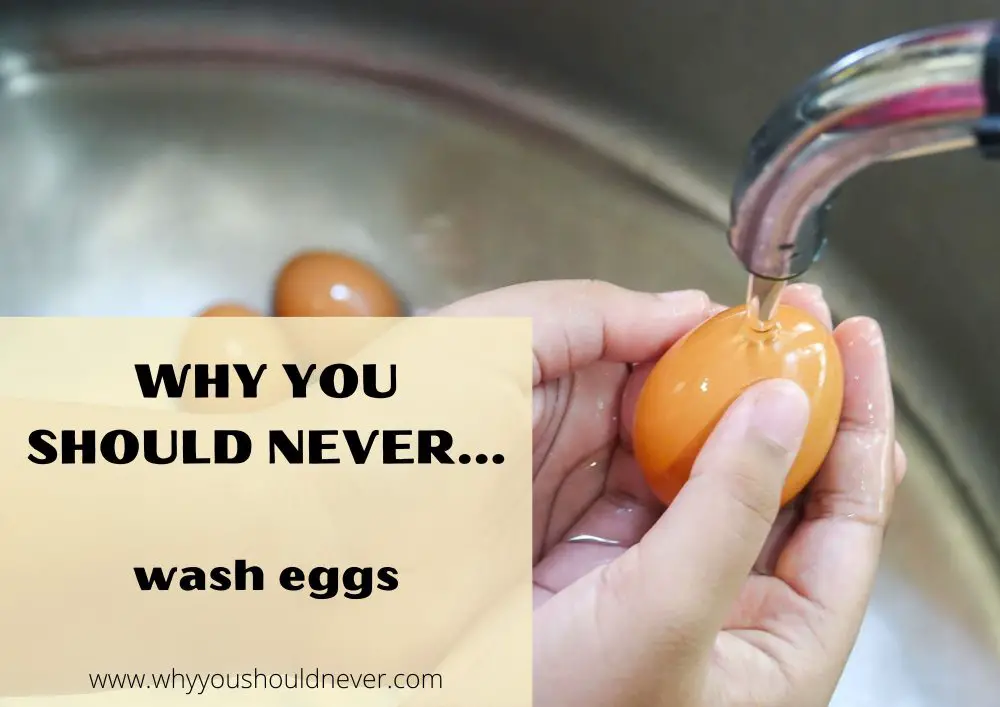![]()
Why You Should Never Wash Eggs
Eggs are a staple in many households, whether for breakfast, baking, or as a protein source.
If you’re a regular egg-consumer, you’ll have noticed that some eggs come with a layer of dirt or feathers. As tempting as it may be to wash them before cracking them open, you should resist the urge. Let’s explore why below.
5 reasons why you shouldn’t wash eggs
1. Eggshells are porous
Eggshells are not impermeable, meaning they have tiny pores that allow air and moisture to pass through. Washing an egg can remove the protective cuticle that covers these pores, making it easier for bacteria to enter the egg and contaminate the yolk or white.
The USDA (United States Department of Agriculture) advises against washing eggs as it can increase the risk of contamination. According to the USDA, washing eggs can transfer bacteria from the outside of the egg to the inside, especially if the water used is not hot enough or the eggs are not dried properly.
2. Eggshells absorb water
Eggshells can absorb water during washing, and this can affect the quality of the egg. When an egg absorbs water, it can cause the egg to spoil faster and increase the risk of bacterial growth.
And if that wasn’t bad enough, the added moisture can dilute the egg’s flavor and affect its texture, making it less desirable for cooking.
3. Eggs have a natural protective layer
Eggs come with a natural protective layer that shields them from bacteria and other contaminants. This layer, known as the cuticle, is a waxy coating that covers the shell and helps to prevent moisture loss and bacterial infection. Washing the eggs can remove this layer, making it easier for bacteria to enter the egg.
4. It’s illegal in some countries
Yep, you read that correctly, it’s illegal to wash eggs in some countries, particularly in Europe and Japan. This is because, as stated previously, the risk of contamination and things like salmonella increase considerably when eggs are washed.
This law does, of course, only apply to people selling eggs, not to the individual buying and using them at home. So you won’t have the cops banging down your door if you put your eggs under a tap, don’t worry!
But it should make you stop and think that many countries find the act of washing eggs so dangerous that it’s prohibited by law. That’s gotta tell you something, right?
5. There are alternative ways to clean eggs
If you’re concerned about the cleanliness of your eggs (which you should be), there are alternative ways to clean them without washing. You can use a dry cloth or sandpaper to gently remove any dirt or debris from the eggshell.
Alternatively, you can also use a food-grade sanitizer or disinfectant spray to clean the eggs, but make sure to follow the manufacturer’s instructions and allow the eggs to dry completely before storing or using them.
Conclusion
We wash our fruits, our vegetables, even the cartons and bottles that go into our fridges, so it would seem logical to wash our eggs too. However, as I hope I’ve sufficiently demonstrated, washing eggs can actually do more harm than good.
Instead of washing, use one of the methods mentioned above to remove any dirt or debris before using or storing your eggs. Remember, cleanliness is important, but so is food safety, and in this case, washing eggs can actually increase the risk of contamination.


